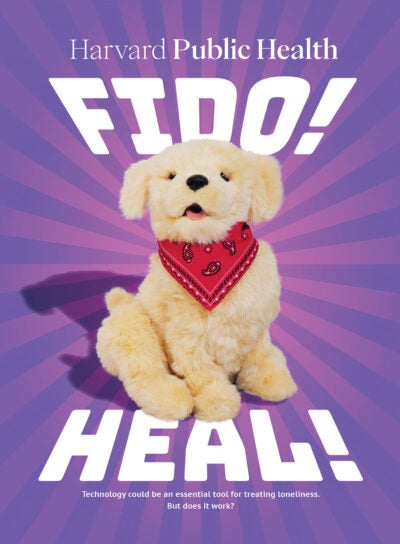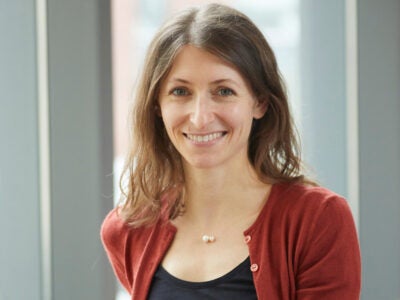
School news
In Brief: Research, initiatives, and other highlights
Paul Biddinger joined medical relief mission to Florida following Hurricane Ian

Photo: Courtesy of Paul Biddinger
After Hurricane Ian in September, with some Florida hospitals damaged or even closed and health care staff exhausted, Harvard Chan School’s Paul Biddinger participated in a medical relief mission. A federally-sponsored team of 37 doctors, nurses, pharmacists, respiratory therapists, and paramedics traveled from Massachusetts to the Sarasota area, north of where the worst damage was. They spent a week running an emergency department set up in tents outside of Sarasota Memorial Hospital-Venice.
The team saw nearly 500 patients during its weeklong clinical operation, said Biddinger, chief preparedness and continuity officer at Mass General Brigham and director of the Emergency Preparedness Research, Evaluation, and Practice (EPREP) Program at Harvard Chan School. He said they treated everything from hurricane-related injuries to chronic conditions.
Biddinger was struck by the dedication of local health care staff, some of whom had lost their homes. “We saw a lot of extraordinary behavior by the medical community,” he said. Read more
C-Change makes the case for climate optimism
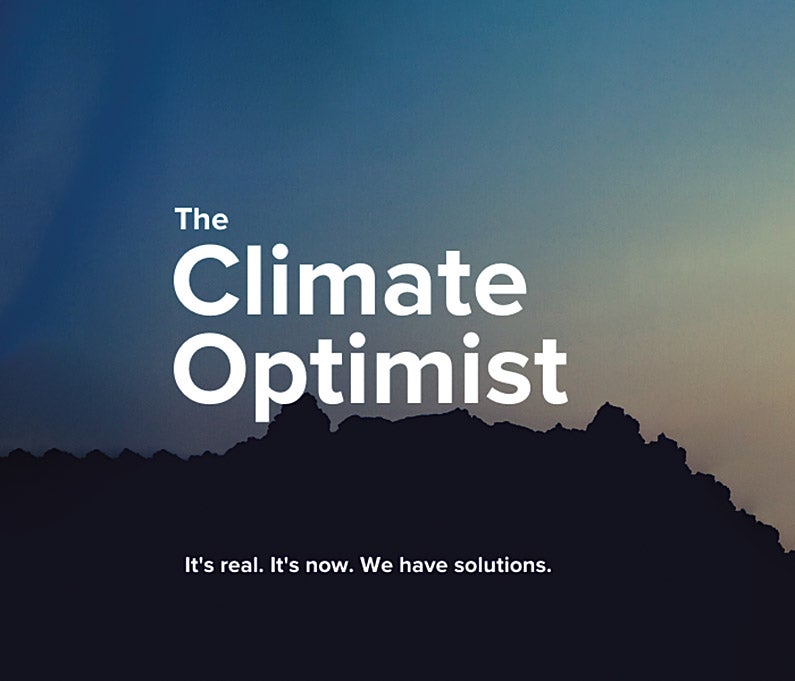
Amid the gloom and doom that typically shapes news and discussions about climate change, a growing number of thought leaders are focusing instead on the positive efforts that are underway in the fight against global warming. One of those is Marcy Franck, senior communications strategist at the Center for Climate, Health, and the Global Environment at Harvard T.H. Chan School of Public Health (Harvard Chan C-CHANGE), who produces C-CHANGE’s newsletter, The Climate Optimist. For example, she used a media appearance to point to recent legislation that is helping push forward the transition to cleaner infrastructure.
“Climate optimism isn’t about denying what we can see with our own eyes, or ignoring our grief for what we’ve lost,” Franck said in a December Well+Good article. “It’s recognizing that we have the solutions, public support, political will, and now, funding to tackle climate head on.” Subscribe to The Climate Optimist
Video takes animated look at menstruation
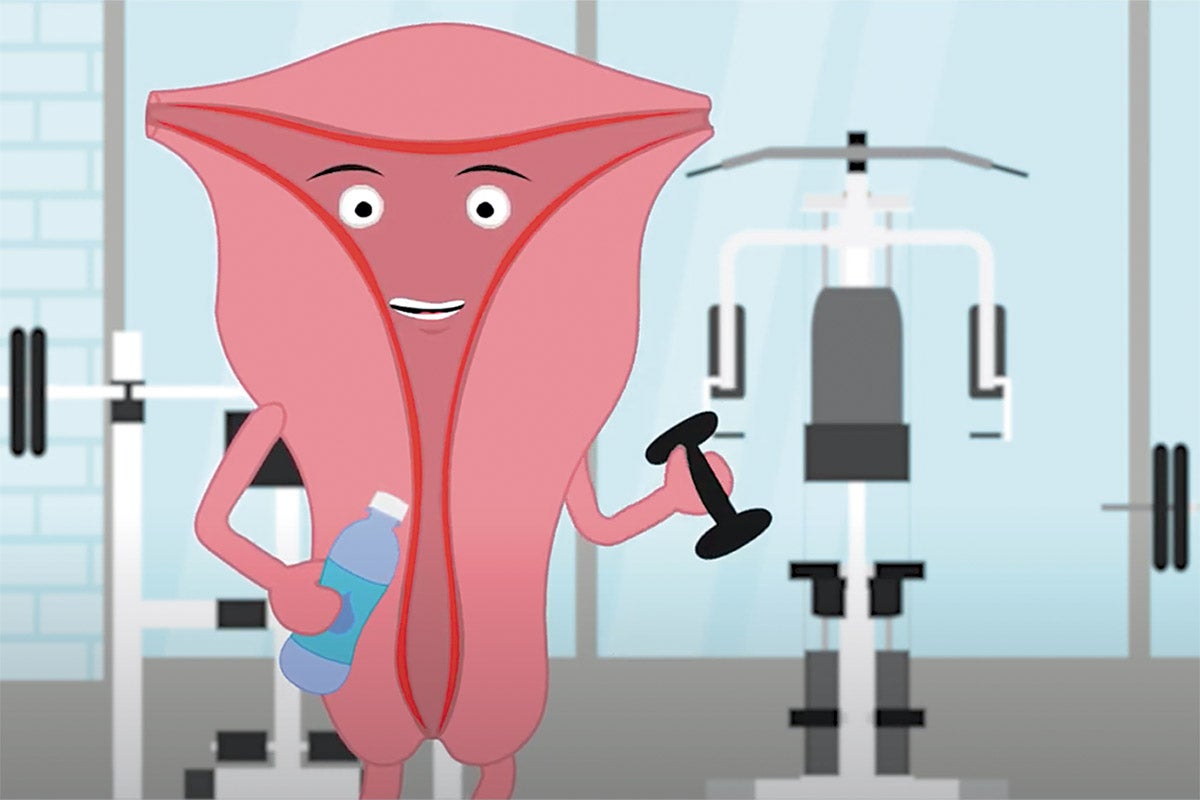
Visitors to Boston’s Museum of Science over the summer were the first to see an educational animation meant to give children and families a lighthearted way to learn about menstruation. The roughly six-minute animation was produced by researchers in the lab of Shruthi Mahalingaiah, assistant professor of environmental, reproductive, and women’s health at Harvard Chan School, and educators at the Museum of Science. The work, supported by a grant from the Harvard Chan-NIEHS Center for Environmental Health, features “Dr. M” (Mahalingaiah) as she walks viewers through the menstrual cycle, which is depicted by animated characters. Watch video
Psychological distress may raise long COVID risk
People who experience psychological distress, including depression, anxiety, worry, and loneliness, before contracting COVID-19 may have higher risk of developing long COVID, according to researchers at Harvard Chan School. Siwen Wang, Andrea Roberts, and colleagues found distress was more strongly associated with developing long COVID than physical health risk factors such as obesity, asthma, and hypertension. The research, published in JAMA Psychiatry in September, was the first known prospective study to examine psychological factors for long COVID.
Long COVID is characterized by symptoms that continue at least several weeks after the initial viral infection. At a September 23 virtual event at the School, experts highlighted long COVID’s wide-ranging impacts—around 23 million people in the U.S., or 20 percent of the nation’s COVID-19 patients, may have the condition—as well as research strategies for advancing treatments and diagnosis.
Environments influence reproductive health and development
Everything from chemicals in beauty products to trauma to climate change, and more, can affect reproductive health and development. It’s a compelling research focus for Carmen Messerlian, assistant professor of environmental reproductive, perinatal, and pediatric epidemiology, and director of Harvard Chan School’s Scientific Early Life Environmental Health & Development Program (SEED). She and her team are looking at the effects of a wide range of exposures across the natural, built, and social environments.
Messerlian recommends medical providers dealing with reproductive issues focus more on their patients’ mental health. In September she told ASRM Today, a podcast of the American Society for Reproductive Medicine, “we need to go back stream to look at what is behind some of these emotional issues that might have roots in earlier life and that might actually impact your current reproductive health.”
White House’s healthy eating strategy has gaps, experts say
The White House launched a new strategy last fall aimed at ending hunger, and increasing healthy eating and physical activity by 2030. The strategy includes expanding nutrition assistance programs, updating rules by which packaged foods can be labeled “healthy,” and covering medically tailored meals under Medicare.
The White House effort, while promising, has major omissions, say nutrition experts at Harvard Chan School. Writing in the New York Daily News, Frank Hu, Fredrick J. Stare Professor of Nutrition and Epidemiology and chair of the Department of Nutrition; Walter Willett, professor of epidemiology and nutrition; and Lilian Cheung, lecturer on nutrition, said policies are needed to reduce diet-related diseases and ensure access to healthy food. Specific steps would be to protect children from unhealthy food marketing and to transform the food system in response to climate change.
At a satellite conference event at Harvard, Willett described work by the new Harvard Food Systems Initiative to transform offerings in the University’s cafeterias. Upcoming menus will take inspiration from the healthy, sustainable, and flavorful traditional cuisines of Latin America, Asia, and the Mediterranean.
Adding spirituality to health care

Attention to patients’ spirituality should be incorporated into care for both serious illness and overall health, according to a study led by researchers at Harvard Chan School and Brigham and Women’s Hospital. They suggest providers speak with patients about their preferences and, if appropriate, connect them with a chaplain or other specialist in clinical spiritual care. “Overlooking spirituality leaves patients feeling disconnected from the health care system and the clinicians trying to care for them,” said senior author Howard Koh, Harvey V. Fineberg Professor of the Practice of Public Health Leadership. “Integrating spirituality into care can help each person have a better chance of reaching complete well-being and their highest attainable standard of health.”
Both organized religion and secular practices help people find meaning and connection and boost patients’ health, the researchers found. They wrote their recommendation, published in Journal of the American Medical Association in July, after they systematically identified and analyzed evidence on spirituality and health published since 2000. Their analysis was assessed by a multidisciplinary panel representing a variety of religious and spiritual views.
Cancer rates grow for people under 50
Incidence rates of early onset cancers—among them breast, colon, esophagus, kidney, liver, and pancreas—have increased globally since the 1990s. The rise parallels global cultural shifts toward eating less-healthy diets, moving less, sleeping less, and drinking more alcohol, say Harvard Chan School researchers. Such changes have altered the early life “exposome,” a measure of an individual’s diet, lifestyle, weight, environmental exposures, and microbiome in the womb and during childhood.
In parallel, early onset cancer risk has increased with each successive generation, according to the researchers. Of the 14 cancers that have been on the rise in younger adults, eight are related to the digestive system. “The food we eat feeds the microorganisms in our gut,” says lead author Tomotaka Ugai, research scientist at Brigham and Women’s Hospital and in the Department of Epidemiology, Harvard Chan School. “Diet directly affects microbiome composition and eventually these changes can influence disease risk and outcomes.”
Sabri Ülker “Metabolism and Life” Symposium returns to in-person programming
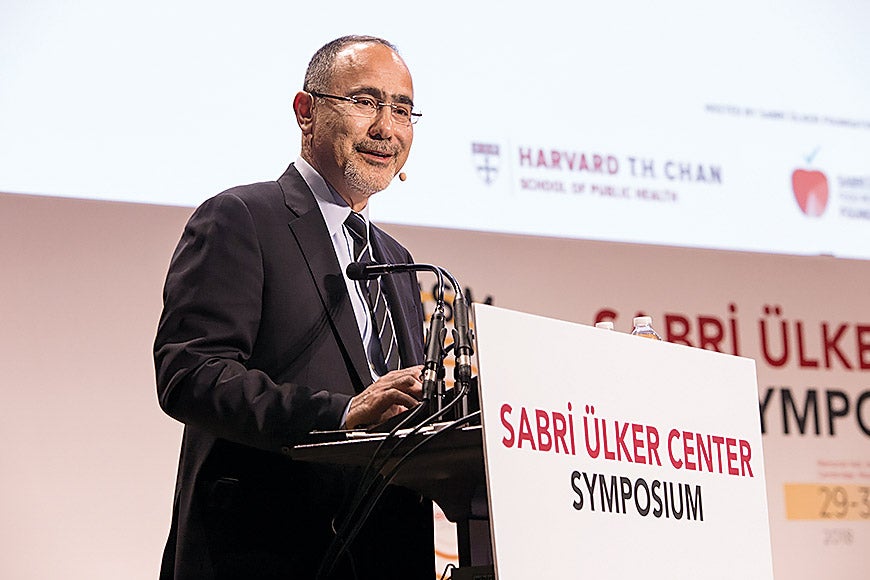
The Sabri Ülker Center for Metabolic Research at Harvard Chan School, directed by Gökhan Hotamışlıgil (pictured), will hold its fourth symposium May 9-10, 2023, in Istanbul, Turkey. The event brings together global experts exploring broad aspects of metabolism in health and disease states and during the aging process.
